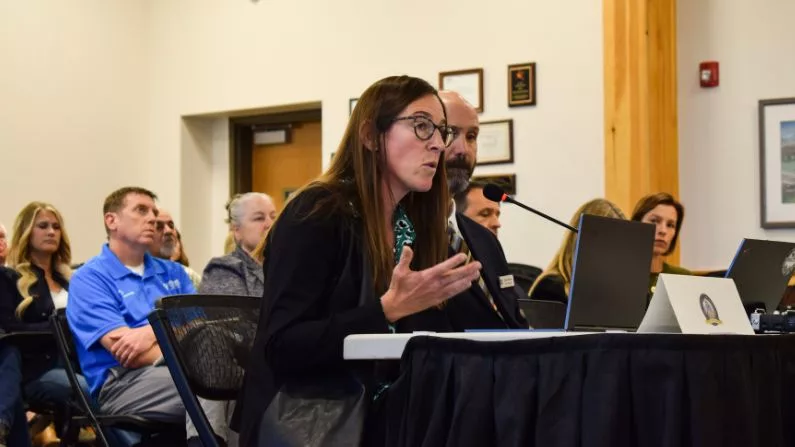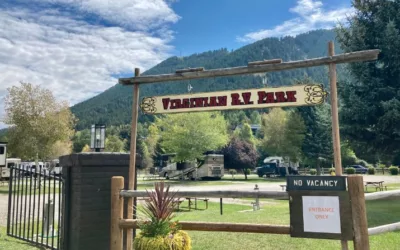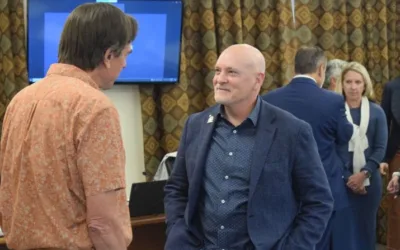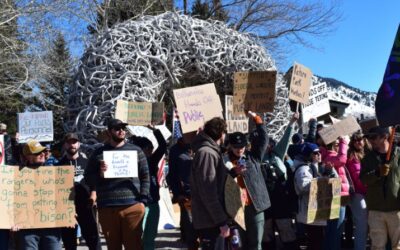Jackson’s housing crisis has become top of mind for some Wyoming lawmakers. A state task force aimed at reducing regulations will meet again on Thursday to consider a slate of draft bills — one of which takes direct aim at housing policy in Teton County.
It carries the potential to restrict local control and the county’s ability to tackle affordability issues, and it has sounded alarm bells for local officials.
“I think it’s potentially disastrous,” Jackson Town Council Member Jim Rooks told KHOL.
One draft bill — before the state’s Regulatory Reduction Task Force — could slice down mitigation fees that developers pay to help house local workers.
“We could lose multiple core abilities to respond to our housing crisis, period,” Rook said.
Tensions between Teton County and the state are nothing new, and some, like Rooks, say they can be eased through coalitions and showing face in Cheyenne.
But will it help repair the county’s relationship with the Cowboy State?
A storied, strained relationship
Rooks said many tensions can be attributed to partisan politics: Teton County has drifted further to the left, while the rest of the state has become more conservative.
“I don’t recognize my state,” Rooks said to a group of local residents at a recent discussion at the Teton County Library.
He said his family’s history in the region goes back 120 years and that he’s lived in nine towns across Wyoming. Rooks said he once considered the state to be strongly libertarian, with people supporting minimal government intervention, but that’s no longer the case.
“I think we’re dealing with some factions in the state that have pushed the state too far to the right, not allowing even moderate Republicans to be part of this organization, and I have deep concerns about it,” said Rooks, who identifies as an Independent.
According to town of Jackson lobbyist Andy Schwartz, who was also at the library discussion, the state has become more conservative with an aging population, as well as with changes in how people consume news.
“We get sucked into the national conversations, which may or may not truly apply to what’s going on in Wyoming,” said Schwartz, who served in the state’s House of Representatives for eight years as a Democrat.
But, he said the tensions run deeper than red and blue politics.
“Teton County, for the last 50 years, has had a completely different economy than the rest of the state,” Schwartz said. “We are a tourism county. Our workforce is not traditional blue collar mining and oil extraction.”
While there’s a housing shortage across the state, the crisis is on steroids in Teton County, where the average sale price for a single-family home is over $5 million.
Friction can also be attributed to geography, Schwartz said. Jackson is located on the western sliver of the state, closer to Boise and Salt Lake City than it is to Cheyenne. With a nearly seven-hour drive on an often snowy highway, many Jacksonsites never get out to the state capitol.
Ruth Ann Petroff with Jackson Hole Working, a group that advocates for the private sector, said people in the rest of state have a lot of misconceptions about those in Teton County.
“A lot of the tension is that we don’t interact with the rest of the state as much as we could and should,” she said.
Appealing to state lawmakers
A former Republican state representative, Petroff has long been working to have her voice heard in the capitol.
In recent years, it’s become increasingly common for Teton County residents to take their concerns to the state level, after not getting their way locally. Those residents tend to lean conservative, like the vast majority of state lawmakers.
Members of Petroff’s group — which includes well known local business owners Kelly Lockhart of Lockhart Cattle Company and Ted Staryk of Snake River Brewing — have been lobbying in Cheyenne for years, in an attempt to lower costs for businesses, including mitigation fees.
They’re a tool Teton County uses to require developers buy in to house local workers. It’s based on the idea that developers generate new employees, so they must help house them.

Jackson/Teton County Housing Director April Norton explains how her department works with the private sector to create affordable units at the last task force meeting in Lander on Sept. 22. (Hanna Merzbach/KHOL)
Between 2018 and 2022, more than a quarter of affordable and workforce housing built in Teton County was sourced from the mitigation program. And that’s even with town and county elected leaders rolling back some of the fees.
Under pressure from Jackson Hole Working and the state, in 2020, local officials cut housing mitigation fees by 50% for commercial development. Petroff said her group was happy with this outcome, though they still want to see more tweaks to the system.
“Our position locally has been that mitigation is a good tool for creating deed-restricted development,” she said. “And that it should not be used as a hammer to stop growth.”
State officials drafted the contentious draft bill that could place a cap on mitigation fees after a handful of Teton County developers and business advocates, including Petroff, aired their grievances about the region’s housing policies.
Petroff said she saw it as an opportunity to work with the state.
“We’re treating the task force as if it is the enemy of Teton County instead of really engaging and saying, ‘What can we learn from it?’” Petroff said.
‘Massaging the bill’
It’s still unclear how exactly the proposed legislation could impact the county, but some locals say it has the potential to slash one of the local affordable housing department’s revenue streams.
It could also impact affordable housing developments, such as northern South Park, currently slated to add roughly 1,500 units to the region’s housing stock.
State Senator Mike Gierau is at the center of much of this debate. He represents Teton County and is one of two Democrats in the Senate. He said he’s gotten a lot of questions from Teton County officials about the draft bills.
“Folks in [Teton County] are like, ‘Why is Gierau doing this?’” he said. “It’s like, well, I’m kind of just part of the cog.”
But he said he sees his role as more than that. He’s a co-chair of the group behind the bills, the Regulatory Reduction Task Force — a role he said he asked for because he anticipated impacts for Teton County.
“So I wanted to be in the middle of it,” Gierau said, “to try to massage the bill.”
He said while other draft bills — one speeding up the permit process for developments and another loosening up restrictions on accessory residential units — could apply to the whole state, the mitigation one is aimed at Teton County, as it’s the only county in the state that uses this method to fund housing.
At the upcoming task force meeting, he said he plans to ask other members to put that bill aside until next spring, after the upcoming legislative session, so there’s time to hear from the public in Teton County.
“I’m going to go out and try to figure out a way to make it better,” Gierau said. “I may not vote for it in the end. But I got to keep working on it. So, I need ideas on how to make it better.”
‘The legislature is like a club’
Even if task force members want to move forward with the bill this session, it’s far from set in stone. It still has to be assigned to a legislative committee and get a two-thirds majority vote from lawmakers to even be introduced.
Schwartz, Jackson’s lobbyist, said he’s not that worried about the impacts to mitigation fees, since it’s a relatively small revenue stream for the housing department. What’s really at stake, he said, is local control — a principle engrained in Wyoming’s constitution.
Moving forward with this kind of legislation sets a bad precedent, he said, and it could impact counties across the state.
“When a disgruntled citizen can take advantage of dynamics in the legislature to overturn local decisions, it’s just not a good thing,” Schwartz said.

Revenue streams like mitigation fees are helping Teton County pay for Jackson Street Apartments, a new affordable housing development currently in construction near downtown. (Hanna Merzbach/KHOL)
One potential solution local officials are identifying: show up in Cheyenne. Rooks, the town council member, said this is a way to show Teton County folks are regular people.
“I think a lot of people in the rest of the state, they don’t know anything or know very little about our community,” he said. “They don’t understand that underneath all of the glitz and glamor of the tabloids, we’re just a normal Wyoming community.”
Rooks said he plans to “double down” with trips to Cheyenne during the upcoming session.
According to Schwartz, it’s valuable when legislators in Cheyenne can put faces to local officials, but there are significant limitations.
“I don’t know how much difference that will ultimately make because the legislature is like a club, and no matter how many relationships a councilman or a commissioner creates, they’re still not a member of the club,” said Schwartz, who — as a former state senator — sees himself as an “emeritus member” of that club.
Many local officials say they see Schwartz as a key asset for getting their voices heard in the capitol. They also see coalitions such as the Wyoming Association of Municipalities and the Wyoming County Commissioners Association as potential avenues for representation.
Rooks said, with growing housing supply issues across the state, Teton County can find allies in those groups.
The mayor of Cody recently urged the regulatory task force to not take away local control when it comes to housing policy.
“It’s Cody, it’s Sheridan, it’s Buffalo, Laramie, Casper, Cheyenne, other places that are starting to deal with some of the challenges that we’re dealing with,” Rooks said.
State officials will discuss housing issues in Teton County — and across the state — at 1 p.m. at a Nov. 9 online meeting, live streamed through the legislature’s website.
Only written testimony will be taken.







